外研版(2019) 选择性必修一 Unit 2 Onwards and upwards Developing ideas 课件(34张ppt)
文档属性
| 名称 | 外研版(2019) 选择性必修一 Unit 2 Onwards and upwards Developing ideas 课件(34张ppt) |
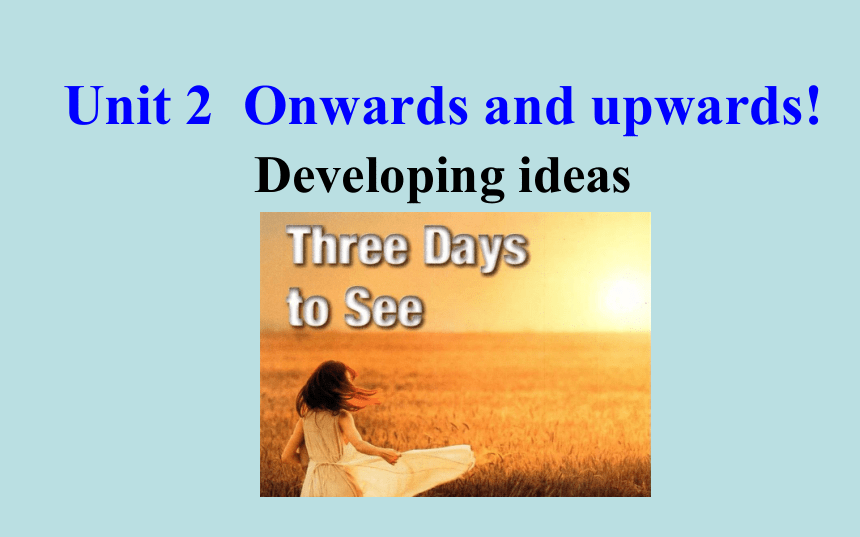
|
|
| 格式 | pptx | ||
| 文件大小 | 1.9MB | ||
| 资源类型 | 教案 | ||
| 版本资源 | 外研版(2019) | ||
| 科目 | 英语 | ||
| 更新时间 | 2020-08-09 00:00:00 | ||
图片预览

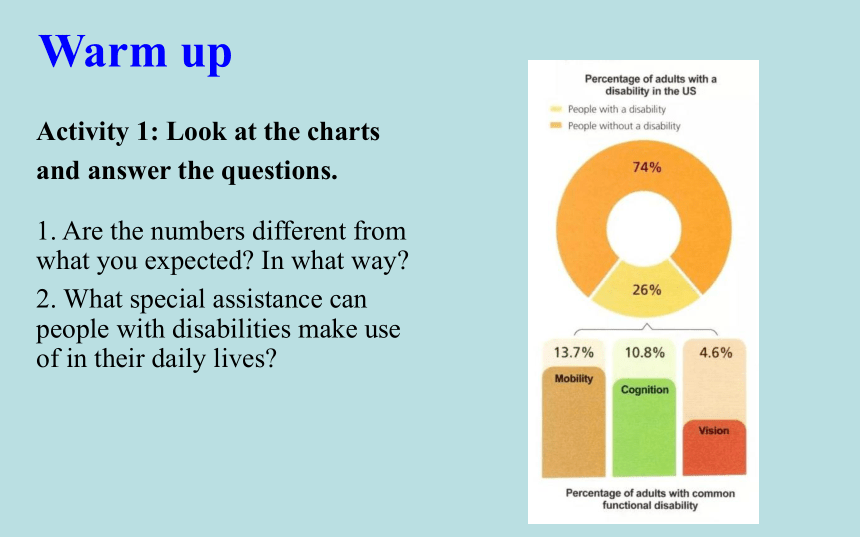
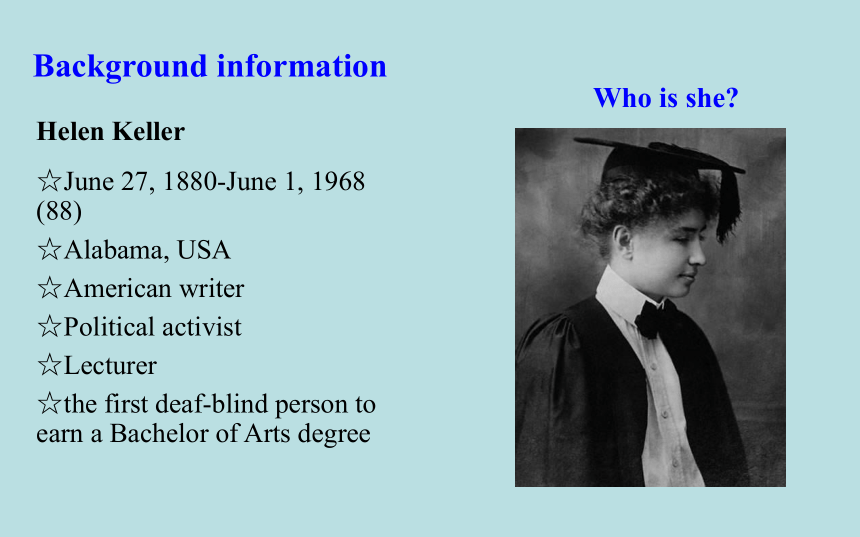
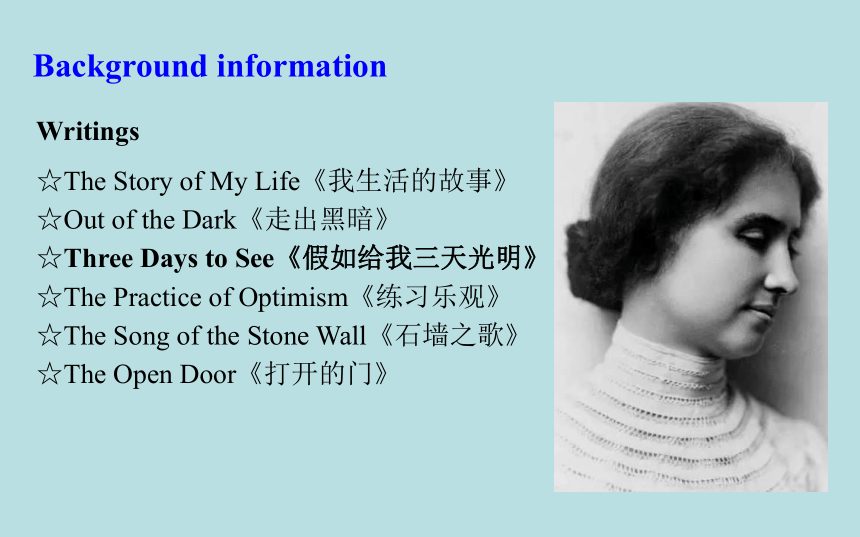
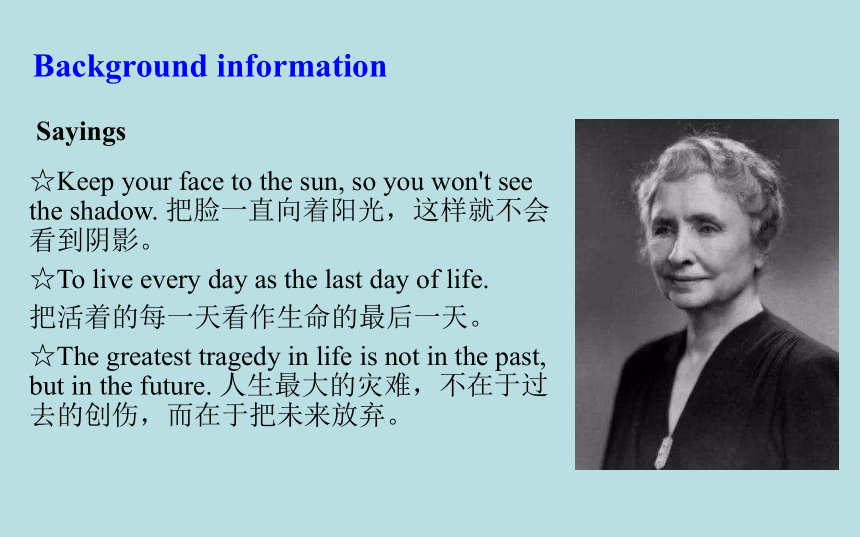
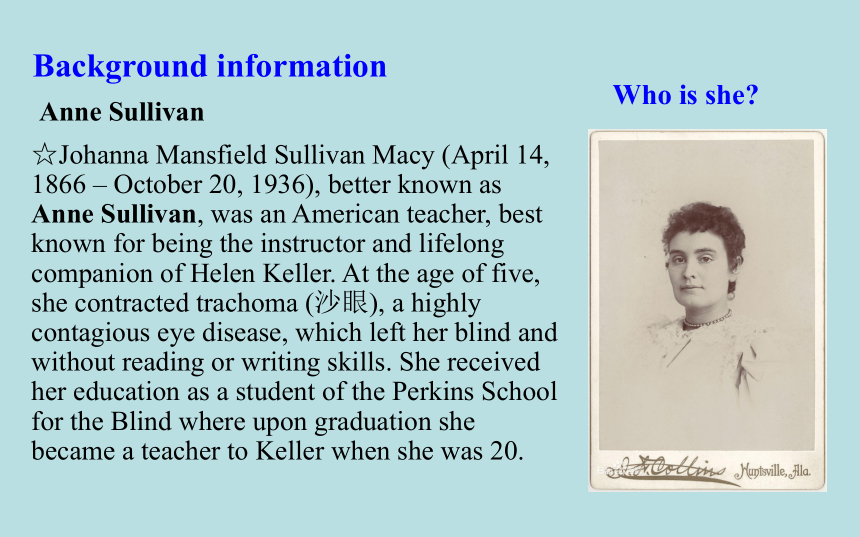
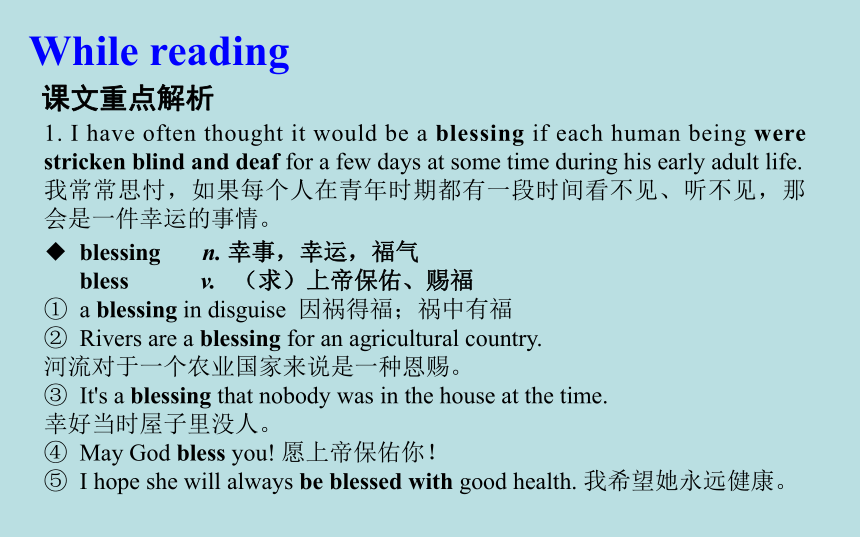
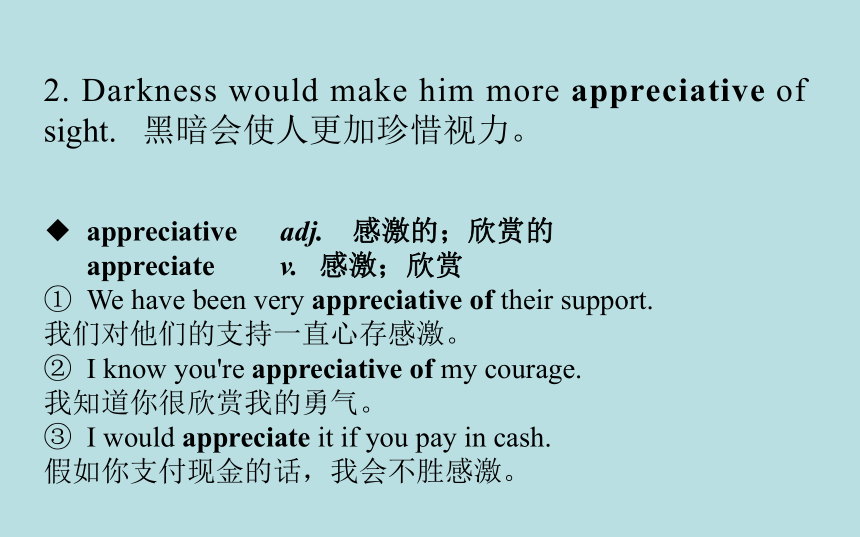
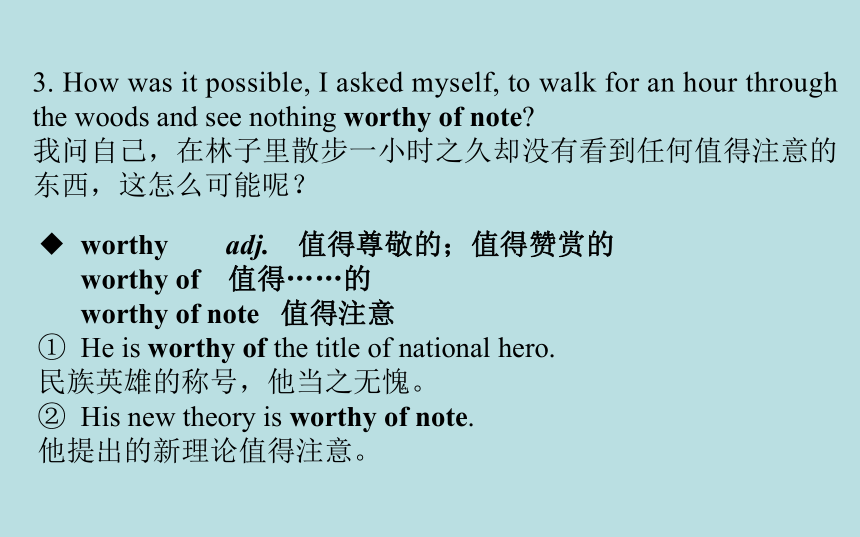
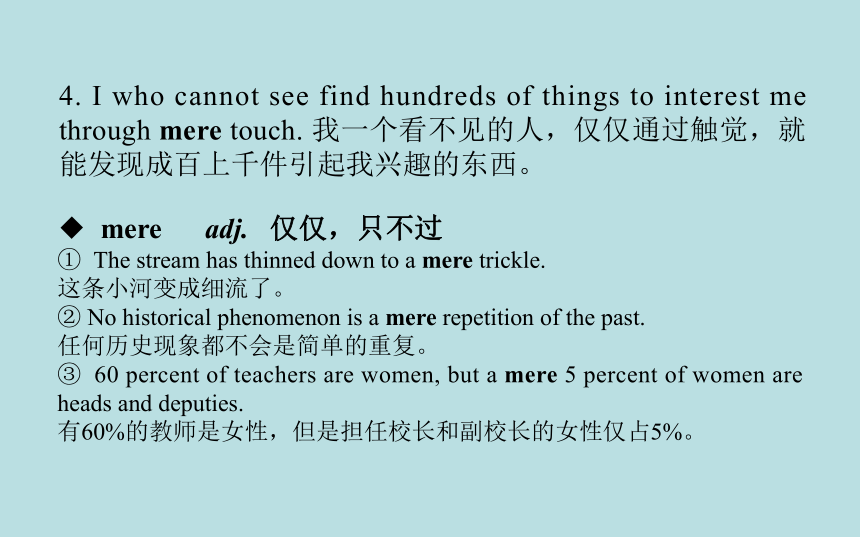
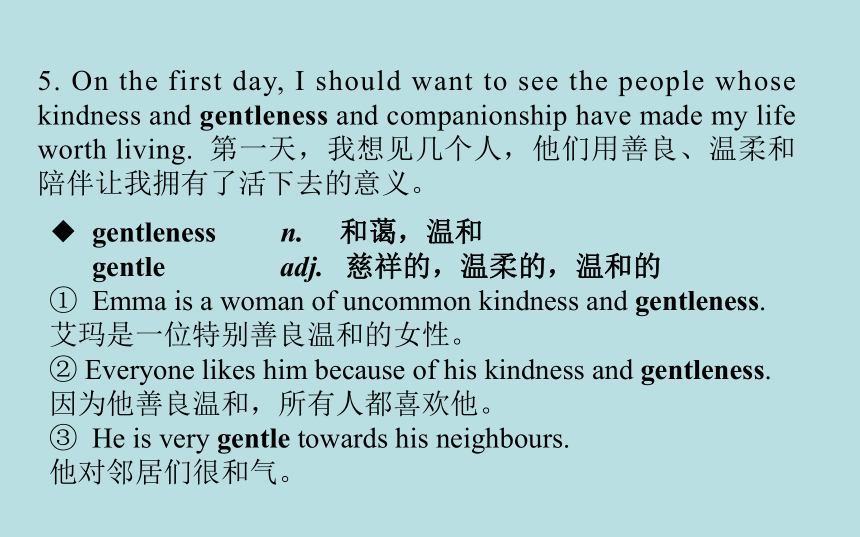
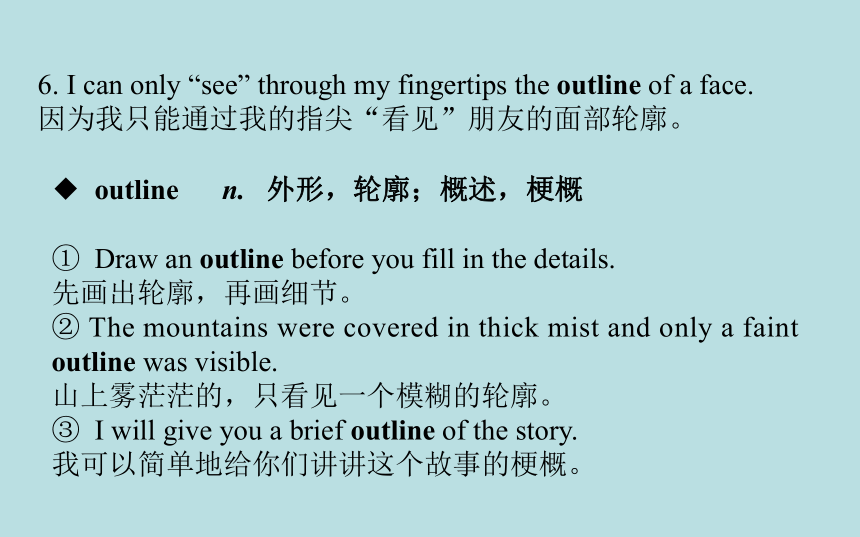
文档简介
Unit 2 Onwards and upwards!
Developing ideas
Warm up
Activity 1: Look at the charts
and answer the questions.
1. Are the numbers different from what you expected? In what way?
2. What special assistance can people with disabilities make use of in their daily lives?
Background information
Helen Keller
☆June 27, 1880-June 1, 1968 (88)
☆Alabama, USA
☆American writer
☆Political activist
☆Lecturer
☆the first deaf-blind person to earn a Bachelor of Arts degree
Who is she?
Background information
Writings
☆The Story of My Life《我生活的故事》
☆Out of the Dark《走出黑暗》
☆Three Days to See《假如给我三天光明》
☆The Practice of Optimism《练习乐观》
☆The Song of the Stone Wall《石墙之歌》
☆The Open Door《打开的门》
Background information
Sayings
☆Keep your face to the sun, so you won't see the shadow. 把脸一直向着阳光,这样就不会看到阴影。
☆To live every day as the last day of life.
把活着的每一天看作生命的最后一天。
☆The greatest tragedy in life is not in the past, but in the future. 人生最大的灾难,不在于过去的创伤,而在于把未来放弃。
Background information
Anne Sullivan
☆Johanna Mansfield Sullivan Macy (April 14, 1866 – October 20, 1936), better known as Anne Sullivan, was an American teacher, best known for being the instructor and lifelong companion of Helen Keller. At the age of five, she contracted trachoma (沙眼), a highly contagious eye disease, which left her blind and without reading or writing skills. She received her education as a student of the Perkins School for the Blind where upon graduation she became a teacher to Keller when she was 20.
Who is she?
While reading
课文重点解析
1. I have often thought it would be a blessing if each human being were stricken blind and deaf for a few days at some time during his early adult life. 我常常思忖,如果每个人在青年时期都有一段时间看不见、听不见,那会是一件幸运的事情。
◆ blessing n. 幸事,幸运,福气
bless v. (求)上帝保佑、赐福
① a blessing in disguise 因祸得福;祸中有福
② Rivers are a blessing for an agricultural country.
河流对于一个农业国家来说是一种恩赐。
③ It's a blessing that nobody was in the house at the time.
幸好当时屋子里没人。
④ May God bless you! 愿上帝保佑你!
⑤ I hope she will always be blessed with good health. 我希望她永远健康。
◆ appreciative adj. 感激的;欣赏的
appreciate v. 感激;欣赏
① We have been very appreciative of their support.
我们对他们的支持一直心存感激。
② I know you're appreciative of my courage.
我知道你很欣赏我的勇气。
③ I would appreciate it if you pay in cash.
假如你支付现金的话,我会不胜感激。
2. Darkness would make him more appreciative of sight. 黑暗会使人更加珍惜视力。
◆ worthy adj. 值得尊敬的;值得赞赏的
worthy of 值得……的
worthy of note 值得注意
① He is worthy of the title of national hero.
民族英雄的称号,他当之无愧。
② His new theory is worthy of note.
他提出的新理论值得注意。
3. How was it possible, I asked myself, to walk for an hour through the woods and see nothing worthy of note?
我问自己,在林子里散步一小时之久却没有看到任何值得注意的东西,这怎么可能呢?
◆ mere adj. 仅仅,只不过
① The stream has thinned down to a mere trickle.
这条小河变成细流了。
② No historical phenomenon is a mere repetition of the past.
任何历史现象都不会是简单的重复。
③ 60 percent of teachers are women, but a mere 5 percent of women are heads and deputies.
有60%的教师是女性,但是担任校长和副校长的女性仅占5%。
4. I who cannot see find hundreds of things to interest me through mere touch. 我一个看不见的人,仅仅通过触觉,就能发现成百上千件引起我兴趣的东西。
◆ gentleness n. 和蔼,温和
gentle adj. 慈祥的,温柔的,温和的
① Emma is a woman of uncommon kindness and gentleness.
艾玛是一位特别善良温和的女性。
② Everyone likes him because of his kindness and gentleness.
因为他善良温和,所有人都喜欢他。
③ He is very gentle towards his neighbours.
他对邻居们很和气。
5. On the first day, I should want to see the people whose kindness and gentleness and companionship have made my life worth living. 第一天,我想见几个人,他们用善良、温柔和陪伴让我拥有了活下去的意义。
◆ outline n. 外形,轮廓;概述,梗概
① Draw an outline before you fill in the details.
先画出轮廓,再画细节。
② The mountains were covered in thick mist and only a faint outline was visible.
山上雾茫茫的,只看见一个模糊的轮廓。
③ I will give you a brief outline of the story.
我可以简单地给你们讲讲这个故事的梗概。
6. I can only “see” through my fingertips the outline of a face.
因为我只能通过我的指尖“看见”朋友的面部轮廓。
◆ pageant n. 盛大的(露天)演出
the pageant of (历史事件的)缤纷场景
① This is going to be an artistic pageant.
这将是一次艺术的盛会。
② The 29th Olympic Games in Beijing 2008 is a sports pageant of the world.
2008年第二十九届北京奥运会是世界体育的一次盛会。
7. On my second day, I should like to see the pageant of man’s progress, and I should go to the museums.
第二天,我想看看人类发展的奇观,我要去博物馆。
8. I should try to probe into the soul of man through his art.
我要通过人类的艺术探究人类的灵魂。
◆ probe v. 调查;探究
① Lucy always wants to probe too deeply into others' personal affairs. 露西总是想过多地打探别人的私事。
② Bob didn't like the media probing into his past.
鲍勃不愿意媒体追问他的过去。
9. Today I shall spend in the workaday world, amid the haunts of men going about the business of life. 这一天,我将在平凡的世界里度过,在为生活奔波的人们常去的地方度过。
◆ go about sth phr v. 开始做某事;做某事(指日常事务)
① How do you go about building a boat?
你怎样开始制造一艘船的?
② Sorry, I have to go about my business.
很抱歉,我得忙我自己的事了。
10. At midnight permanent night would close in on me again.
午夜,永恒的黑暗将再次把我笼罩。
◆ permanent adj. 长久的;永久的
① Nothing can assure permanent happiness.
没有东西能担保永久的幸福。
② No one can offer a permanent solution to the problem.
没有人能提出解决这个问题的长久之计。
③ China is one of the five permanent member states of the UN. 中国是联合国安理会五个常任理事国之一。
10. At midnight permanent night would close in on me again.
午夜,永恒的黑暗将再次把我笼罩。
◆ close in+on/around/upon... 包围,合拢,靠近
① And I felt the whole room close in on me.
我感觉到整个房间都向我压下来。
② We got quite worried as winter closed in on us.
在严冬逼近时我们非常发愁。
③ Before the boys can flee, the police close in on them.
警察包围了他们,两个男孩无处可逃。
11. Only when darkness had again descended upon me should I realize how much I had left unseen. 唯有在黑暗再次来袭时,我才意识到我还有那么多事情没有看到。
◆ descend v. 降临;来临
①Darkness has now descended and the moon and stars shine hazily in the clear sky.
夜幕现在已经降临,晴朗的天空里月影婆娑,星光朦胧。
② Total silence descended on the classroom.
教室里突然一片寂静。
12. I who am blind can give one hint to those who see:
我,一个盲人,可以给那些看得见的人一个忠告:
◆ give (sb) a hint 给(某人)暗示
① Don't give a hint of it to him. 不要让他知道这件事。
② Could you give me a hint? 你能给我一个提示吗?
③ I'll give you a hint: The answer isn't geographic but demographic.
给你个提示:答案与地理无关,而与人口有关。
13. the mighty strains of an orchestra 交响乐的震撼音符
◆ strains of sth 音乐的曲调和旋律
① We sipped wine to the strains of Beethoven.
我们一边听贝多芬的旋律一边小口抿着酒。
② She could hear the tinny strains of a chamber orchestra.
她能听见室内管弦乐队尖细的旋律。
After reading
1. To help readers understand what it is like to be blind.
2. To make readers without disabilities appreciate what they have.
3. To persuade readers to care about the blind.
Activity:Choose the author's purpose in writing the passage and give your reasons.
Think & Share
1. What are the main wishes of the author? Give an example.
2. Do you know of any stories about people with disabilities? Share one with the class.
3. How should we interact with people with disabilities?
Learning to learn
1. What sentence structure is used repeatedly? What figure of speech is it?
2. How does this technique help to express the author's emotions?
Read the sentences from the passage and answer the questions.
Learning to learn
1. Definition
A parallelism is a figure of speech that uses similar structures in separate sentences to express related ideas and with which the sentence is emphatic and forceful. In parallel structure it is necessary to balance word for word, phrase for phrase, clause for clause and sentence for sentence.
Parallelism
Learning to learn
2. Example
☆Galileo studied, thought, and experimented.
☆She traveled by land, by sea, and by air.
☆A teacher who spends time with his students and who thoughtfully answers their questions will be respected and loved.
☆There is no reason for us to be enemies. Neither of us seeks the territory of the other; neither of us seeks domination over the other; neither of us seeks to stretch out our hands and rule the world.
Parallelism
Learning to learn
3. Function
☆make the writing effective and forceful
☆make the writing clear and logical
☆make the writing more rhythmical and emotional
Can you give more examples of parallelism? Share them with the class.
Parallelism
原文与译文欣赏
I have often thought it would be a blessing if each human being were stricken blind and deaf for a few days at some time during his early adult life. Darkness would make him more appreciative of sight; silence would teach him the joys of sound.
我常常思忖,如果每个人在青年时期都有一段时间看不见、听不见,那会是一件幸运的事情,因为黑暗会使人更加珍惜视力,静默能教会人享受声音的美妙。
Three Days to See
假如给我三天光明
Now and then I have tested my seeing friends to discover what they see. Recently, I asked a friend who had just returned from a long walk in the woods what she had observed. “Nothing in particular,” she replied.
我时常询问我那些看得见的朋友们,想了解他们看到了什么。最近,我问一个从林子里散步了许久回来的朋友观察到了什么,她答道:“没什么特别的。”
How was it possible, I asked myself, to walk for an hour through the woods and see nothing worthy of note? I who cannot see find hundreds of things to interest me through mere touch. If I can get so much pleasure from touch, how much more beauty must be revealed by sight? And I have imagined what I should most like to see if I were given the use of my eyes, say for just three days.
我问自己,在林子里散步一小时之久却没有看到任何值得注意的东西,这怎么可能呢?我一个看不见的人,仅仅通过触觉,就能发现成百上千件引起我兴趣的东西。如果仅仅通过触觉就能得到如此多的快乐,那么视觉能展现多少美好的事物啊。我想象过,如果我能被恩赐恢复视觉,哪怕只有三天,我最希望看到什么。
On the first day, I should want to see the people whose kindness and gentleness and companionship have made my life worth living. I don not know what it is to see into the heart of a friend through that “window of the soul”, the eye. I can only “see” through my fingertips the outline of a face. I should like to see the books which have been read to me, and which I have revealed to me the deepest channels of human life and the human spirit. In the afternoon I should take a long walk in the woods and intoxicate my eyes on the beauties of the world of nature. That night, I should not be able to sleep.
第一天,我想见几个人,他们用善良、温柔和陪伴让我拥有了活下去的意义。我不知道通过“心灵的窗户”——眼睛来了解一个朋友是怎样一种体验。因为我只能通过我的指尖“看见”朋友的面部轮廓。我还要看书,那些别人读给我的书,那些为我揭示了人生和人类精神的深刻奥秘的书。到了下午,我要在树林中散步,让我的目光陶醉在自然界的美景中。这个夜晚,我夜不能寐。
On my second day, I should like to see the pageant of man’s progress, and I should go to the museums. I should try to probe into the soul of man through his art. The things I knew through touch I should now see. The evening of my second day I should spend at a theater or at the movies.
第二天,我想看人类发展的奇观,我要去博物馆。我要通过人类的艺术探究人类的灵魂。那些之前通过触摸知晓的事物,我现在要亲眼看一看。而这一天的傍晚, 我要在剧院或电影院度过。
The following morning, I should again greet the dawn, anxious to discover new delights, new revelations of beauty. Today I shall spend in the workaday world, amid the haunts of men going about the business of life.
第三天清晨,我将再次迎接黎明,热切地去探索更多愉悦,发现更多美好。这天我将在平凡的世界里度过,在为生活奔波的人们常去的地方度过。
At midnight permanent night would close in on me again. Only when darkness had again descended upon me should I realize how much I had left unseen.
午夜,永恒的黑暗将再次把我笼罩。唯有在黑暗再次来袭时,我才意识到我还有那么多事情没有看到。
I who am blind can give one hint to those who see: Use your eyes as if tomorrow you would be stricken blind. And the same method can be applied to the other senses. Hear the music of voices, the song of a bird, the mighty strains of an orchestra, as if you would be stricken deaf tomorrow. Touch each object you want to touch as if tomorrow your tactile sense would fail. Smell the perfume of flowers, taste with relish each morsel, as if tomorrow you could never smell and taste again. But of all the senses, I am sure that sight must be the most delightful.
我,一个盲人,可以给那些看得见的人一个忠告:要像明天就要惨遭失明之痛一样去使用你的眼睛。同样的方法也能用于其他感官:要像明天就要惨遭失聪之痛一样,去仔细聆听音乐的旋律、鸟儿的歌唱、交响乐的震撼音符;要像明天就会触觉衰退一样,去触摸你想摸的每件物品;要像明天就会丧失嗅觉和味觉一样,去闻鲜花的芬香,品尝美味佳肴。但是,在所有的感觉中,我相信,视觉一定是最令人愉快的。
(Excerpts from “Three Days to See” by Helen Keller)
(节选自海伦·凯勒的《假如给我三天光明》)
Thank you!
Developing ideas
Warm up
Activity 1: Look at the charts
and answer the questions.
1. Are the numbers different from what you expected? In what way?
2. What special assistance can people with disabilities make use of in their daily lives?
Background information
Helen Keller
☆June 27, 1880-June 1, 1968 (88)
☆Alabama, USA
☆American writer
☆Political activist
☆Lecturer
☆the first deaf-blind person to earn a Bachelor of Arts degree
Who is she?
Background information
Writings
☆The Story of My Life《我生活的故事》
☆Out of the Dark《走出黑暗》
☆Three Days to See《假如给我三天光明》
☆The Practice of Optimism《练习乐观》
☆The Song of the Stone Wall《石墙之歌》
☆The Open Door《打开的门》
Background information
Sayings
☆Keep your face to the sun, so you won't see the shadow. 把脸一直向着阳光,这样就不会看到阴影。
☆To live every day as the last day of life.
把活着的每一天看作生命的最后一天。
☆The greatest tragedy in life is not in the past, but in the future. 人生最大的灾难,不在于过去的创伤,而在于把未来放弃。
Background information
Anne Sullivan
☆Johanna Mansfield Sullivan Macy (April 14, 1866 – October 20, 1936), better known as Anne Sullivan, was an American teacher, best known for being the instructor and lifelong companion of Helen Keller. At the age of five, she contracted trachoma (沙眼), a highly contagious eye disease, which left her blind and without reading or writing skills. She received her education as a student of the Perkins School for the Blind where upon graduation she became a teacher to Keller when she was 20.
Who is she?
While reading
课文重点解析
1. I have often thought it would be a blessing if each human being were stricken blind and deaf for a few days at some time during his early adult life. 我常常思忖,如果每个人在青年时期都有一段时间看不见、听不见,那会是一件幸运的事情。
◆ blessing n. 幸事,幸运,福气
bless v. (求)上帝保佑、赐福
① a blessing in disguise 因祸得福;祸中有福
② Rivers are a blessing for an agricultural country.
河流对于一个农业国家来说是一种恩赐。
③ It's a blessing that nobody was in the house at the time.
幸好当时屋子里没人。
④ May God bless you! 愿上帝保佑你!
⑤ I hope she will always be blessed with good health. 我希望她永远健康。
◆ appreciative adj. 感激的;欣赏的
appreciate v. 感激;欣赏
① We have been very appreciative of their support.
我们对他们的支持一直心存感激。
② I know you're appreciative of my courage.
我知道你很欣赏我的勇气。
③ I would appreciate it if you pay in cash.
假如你支付现金的话,我会不胜感激。
2. Darkness would make him more appreciative of sight. 黑暗会使人更加珍惜视力。
◆ worthy adj. 值得尊敬的;值得赞赏的
worthy of 值得……的
worthy of note 值得注意
① He is worthy of the title of national hero.
民族英雄的称号,他当之无愧。
② His new theory is worthy of note.
他提出的新理论值得注意。
3. How was it possible, I asked myself, to walk for an hour through the woods and see nothing worthy of note?
我问自己,在林子里散步一小时之久却没有看到任何值得注意的东西,这怎么可能呢?
◆ mere adj. 仅仅,只不过
① The stream has thinned down to a mere trickle.
这条小河变成细流了。
② No historical phenomenon is a mere repetition of the past.
任何历史现象都不会是简单的重复。
③ 60 percent of teachers are women, but a mere 5 percent of women are heads and deputies.
有60%的教师是女性,但是担任校长和副校长的女性仅占5%。
4. I who cannot see find hundreds of things to interest me through mere touch. 我一个看不见的人,仅仅通过触觉,就能发现成百上千件引起我兴趣的东西。
◆ gentleness n. 和蔼,温和
gentle adj. 慈祥的,温柔的,温和的
① Emma is a woman of uncommon kindness and gentleness.
艾玛是一位特别善良温和的女性。
② Everyone likes him because of his kindness and gentleness.
因为他善良温和,所有人都喜欢他。
③ He is very gentle towards his neighbours.
他对邻居们很和气。
5. On the first day, I should want to see the people whose kindness and gentleness and companionship have made my life worth living. 第一天,我想见几个人,他们用善良、温柔和陪伴让我拥有了活下去的意义。
◆ outline n. 外形,轮廓;概述,梗概
① Draw an outline before you fill in the details.
先画出轮廓,再画细节。
② The mountains were covered in thick mist and only a faint outline was visible.
山上雾茫茫的,只看见一个模糊的轮廓。
③ I will give you a brief outline of the story.
我可以简单地给你们讲讲这个故事的梗概。
6. I can only “see” through my fingertips the outline of a face.
因为我只能通过我的指尖“看见”朋友的面部轮廓。
◆ pageant n. 盛大的(露天)演出
the pageant of (历史事件的)缤纷场景
① This is going to be an artistic pageant.
这将是一次艺术的盛会。
② The 29th Olympic Games in Beijing 2008 is a sports pageant of the world.
2008年第二十九届北京奥运会是世界体育的一次盛会。
7. On my second day, I should like to see the pageant of man’s progress, and I should go to the museums.
第二天,我想看看人类发展的奇观,我要去博物馆。
8. I should try to probe into the soul of man through his art.
我要通过人类的艺术探究人类的灵魂。
◆ probe v. 调查;探究
① Lucy always wants to probe too deeply into others' personal affairs. 露西总是想过多地打探别人的私事。
② Bob didn't like the media probing into his past.
鲍勃不愿意媒体追问他的过去。
9. Today I shall spend in the workaday world, amid the haunts of men going about the business of life. 这一天,我将在平凡的世界里度过,在为生活奔波的人们常去的地方度过。
◆ go about sth phr v. 开始做某事;做某事(指日常事务)
① How do you go about building a boat?
你怎样开始制造一艘船的?
② Sorry, I have to go about my business.
很抱歉,我得忙我自己的事了。
10. At midnight permanent night would close in on me again.
午夜,永恒的黑暗将再次把我笼罩。
◆ permanent adj. 长久的;永久的
① Nothing can assure permanent happiness.
没有东西能担保永久的幸福。
② No one can offer a permanent solution to the problem.
没有人能提出解决这个问题的长久之计。
③ China is one of the five permanent member states of the UN. 中国是联合国安理会五个常任理事国之一。
10. At midnight permanent night would close in on me again.
午夜,永恒的黑暗将再次把我笼罩。
◆ close in+on/around/upon... 包围,合拢,靠近
① And I felt the whole room close in on me.
我感觉到整个房间都向我压下来。
② We got quite worried as winter closed in on us.
在严冬逼近时我们非常发愁。
③ Before the boys can flee, the police close in on them.
警察包围了他们,两个男孩无处可逃。
11. Only when darkness had again descended upon me should I realize how much I had left unseen. 唯有在黑暗再次来袭时,我才意识到我还有那么多事情没有看到。
◆ descend v. 降临;来临
①Darkness has now descended and the moon and stars shine hazily in the clear sky.
夜幕现在已经降临,晴朗的天空里月影婆娑,星光朦胧。
② Total silence descended on the classroom.
教室里突然一片寂静。
12. I who am blind can give one hint to those who see:
我,一个盲人,可以给那些看得见的人一个忠告:
◆ give (sb) a hint 给(某人)暗示
① Don't give a hint of it to him. 不要让他知道这件事。
② Could you give me a hint? 你能给我一个提示吗?
③ I'll give you a hint: The answer isn't geographic but demographic.
给你个提示:答案与地理无关,而与人口有关。
13. the mighty strains of an orchestra 交响乐的震撼音符
◆ strains of sth 音乐的曲调和旋律
① We sipped wine to the strains of Beethoven.
我们一边听贝多芬的旋律一边小口抿着酒。
② She could hear the tinny strains of a chamber orchestra.
她能听见室内管弦乐队尖细的旋律。
After reading
1. To help readers understand what it is like to be blind.
2. To make readers without disabilities appreciate what they have.
3. To persuade readers to care about the blind.
Activity:Choose the author's purpose in writing the passage and give your reasons.
Think & Share
1. What are the main wishes of the author? Give an example.
2. Do you know of any stories about people with disabilities? Share one with the class.
3. How should we interact with people with disabilities?
Learning to learn
1. What sentence structure is used repeatedly? What figure of speech is it?
2. How does this technique help to express the author's emotions?
Read the sentences from the passage and answer the questions.
Learning to learn
1. Definition
A parallelism is a figure of speech that uses similar structures in separate sentences to express related ideas and with which the sentence is emphatic and forceful. In parallel structure it is necessary to balance word for word, phrase for phrase, clause for clause and sentence for sentence.
Parallelism
Learning to learn
2. Example
☆Galileo studied, thought, and experimented.
☆She traveled by land, by sea, and by air.
☆A teacher who spends time with his students and who thoughtfully answers their questions will be respected and loved.
☆There is no reason for us to be enemies. Neither of us seeks the territory of the other; neither of us seeks domination over the other; neither of us seeks to stretch out our hands and rule the world.
Parallelism
Learning to learn
3. Function
☆make the writing effective and forceful
☆make the writing clear and logical
☆make the writing more rhythmical and emotional
Can you give more examples of parallelism? Share them with the class.
Parallelism
原文与译文欣赏
I have often thought it would be a blessing if each human being were stricken blind and deaf for a few days at some time during his early adult life. Darkness would make him more appreciative of sight; silence would teach him the joys of sound.
我常常思忖,如果每个人在青年时期都有一段时间看不见、听不见,那会是一件幸运的事情,因为黑暗会使人更加珍惜视力,静默能教会人享受声音的美妙。
Three Days to See
假如给我三天光明
Now and then I have tested my seeing friends to discover what they see. Recently, I asked a friend who had just returned from a long walk in the woods what she had observed. “Nothing in particular,” she replied.
我时常询问我那些看得见的朋友们,想了解他们看到了什么。最近,我问一个从林子里散步了许久回来的朋友观察到了什么,她答道:“没什么特别的。”
How was it possible, I asked myself, to walk for an hour through the woods and see nothing worthy of note? I who cannot see find hundreds of things to interest me through mere touch. If I can get so much pleasure from touch, how much more beauty must be revealed by sight? And I have imagined what I should most like to see if I were given the use of my eyes, say for just three days.
我问自己,在林子里散步一小时之久却没有看到任何值得注意的东西,这怎么可能呢?我一个看不见的人,仅仅通过触觉,就能发现成百上千件引起我兴趣的东西。如果仅仅通过触觉就能得到如此多的快乐,那么视觉能展现多少美好的事物啊。我想象过,如果我能被恩赐恢复视觉,哪怕只有三天,我最希望看到什么。
On the first day, I should want to see the people whose kindness and gentleness and companionship have made my life worth living. I don not know what it is to see into the heart of a friend through that “window of the soul”, the eye. I can only “see” through my fingertips the outline of a face. I should like to see the books which have been read to me, and which I have revealed to me the deepest channels of human life and the human spirit. In the afternoon I should take a long walk in the woods and intoxicate my eyes on the beauties of the world of nature. That night, I should not be able to sleep.
第一天,我想见几个人,他们用善良、温柔和陪伴让我拥有了活下去的意义。我不知道通过“心灵的窗户”——眼睛来了解一个朋友是怎样一种体验。因为我只能通过我的指尖“看见”朋友的面部轮廓。我还要看书,那些别人读给我的书,那些为我揭示了人生和人类精神的深刻奥秘的书。到了下午,我要在树林中散步,让我的目光陶醉在自然界的美景中。这个夜晚,我夜不能寐。
On my second day, I should like to see the pageant of man’s progress, and I should go to the museums. I should try to probe into the soul of man through his art. The things I knew through touch I should now see. The evening of my second day I should spend at a theater or at the movies.
第二天,我想看人类发展的奇观,我要去博物馆。我要通过人类的艺术探究人类的灵魂。那些之前通过触摸知晓的事物,我现在要亲眼看一看。而这一天的傍晚, 我要在剧院或电影院度过。
The following morning, I should again greet the dawn, anxious to discover new delights, new revelations of beauty. Today I shall spend in the workaday world, amid the haunts of men going about the business of life.
第三天清晨,我将再次迎接黎明,热切地去探索更多愉悦,发现更多美好。这天我将在平凡的世界里度过,在为生活奔波的人们常去的地方度过。
At midnight permanent night would close in on me again. Only when darkness had again descended upon me should I realize how much I had left unseen.
午夜,永恒的黑暗将再次把我笼罩。唯有在黑暗再次来袭时,我才意识到我还有那么多事情没有看到。
I who am blind can give one hint to those who see: Use your eyes as if tomorrow you would be stricken blind. And the same method can be applied to the other senses. Hear the music of voices, the song of a bird, the mighty strains of an orchestra, as if you would be stricken deaf tomorrow. Touch each object you want to touch as if tomorrow your tactile sense would fail. Smell the perfume of flowers, taste with relish each morsel, as if tomorrow you could never smell and taste again. But of all the senses, I am sure that sight must be the most delightful.
我,一个盲人,可以给那些看得见的人一个忠告:要像明天就要惨遭失明之痛一样去使用你的眼睛。同样的方法也能用于其他感官:要像明天就要惨遭失聪之痛一样,去仔细聆听音乐的旋律、鸟儿的歌唱、交响乐的震撼音符;要像明天就会触觉衰退一样,去触摸你想摸的每件物品;要像明天就会丧失嗅觉和味觉一样,去闻鲜花的芬香,品尝美味佳肴。但是,在所有的感觉中,我相信,视觉一定是最令人愉快的。
(Excerpts from “Three Days to See” by Helen Keller)
(节选自海伦·凯勒的《假如给我三天光明》)
Thank you!
